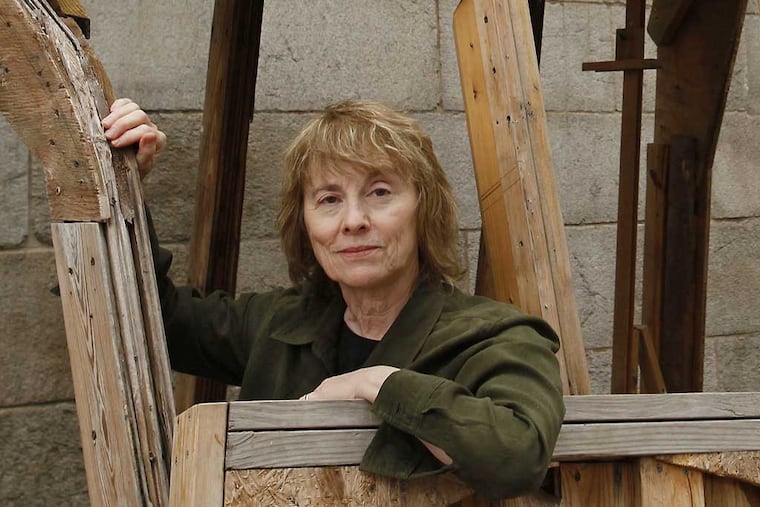Kudos to UArts leaders for supporting Camille Paglia amid demands from campus radicals | Opinion
Every year, thousands of college students graduate and carry into society the same megalomaniacal confidence in their own righteousness that has turned campuses into zones of conformity.

Given the cowardice of university administrators in the face of student social-justice tantrums, any example of adult leadership should be celebrated. And the last few weeks have offered signs of hope. On April 9, at the University of the Arts in Philadelphia, professor Camille Paglia, famed nemesis of victimology feminists everywhere, gave a lecture entitled “Sexual Duality and Sexual Multiplicity in Western Art.” A self-described “nonbinary” student, Joseph McAndrew, organized a protest against the speech.
McAndrew was upset by recent interviews Paglia had given. In one, she challenged the seriousness of campus rape allegations brought six months after the fact. In another interview, she observed that transidentity had become a fashion statement and called sex-reassignment surgery for children and adolescents a crime against humanity, since children are too immature to make such a life-altering decision.
McAndrew blended victimology and the consumerist model of education in his complaint. “We’re giving a space for her following to come, into our safe space that we pay to be in,” McAndrew told The Inquirer. A photo of the protest shows a group of well-fed, healthy, privileged teenagers sitting in a lobby under a large banner reading “Camille Paglia, Stop Victim Blaming.” They hold signs such as “Sexual Assault Is NEVER the victims [sic] fault.”
About 30 minutes into Paglia’s lecture, someone pulled a fire alarm. All 17 floors of the building where Paglia was speaking had to be evacuated into the nighttime streets of downtown Philadelphia, while protesters continued to chant: “Trans lives matter! We believe survivors!”
On many other campuses, such tactics would have been greeted by an expression of concern for the wounded “survivors.” President David Yager, however, denounced the repressive mind-set spreading from American campuses to the culture at large. The suppression of speech “simply cannot be allowed to happen,” he wrote in a campuswide email. “I firmly believe that limiting the range of voices in society erodes our democracy …. Artists over the centuries have suffered censorship, and even persecution, for the expression of their beliefs through their work. My answer is simple: Not now, not at UArts.”
Paglia’s opponents have launched a Change.org petition demanding that Paglia be fired and replaced with a “queer person of color.” Yager must also apologize for his “wildly ignorant and hypocritical letter,” and sit down with a group of “survivors” and trans students — a group that “must include students of color” — to discuss “how they can best be supported moving forward.” The petition ends with a stiff admonition: “UArts: you are disrespecting your students and putting them in danger. Do better.”
The hysteria over Paglia is particularly ironic, since her scholarship celebrates the fluidity of sex and gender in art; she was investigating transsexual identity decades before it became an adolescent status symbol. But today’s students will never let their own ignorance stand in the way of a good temper tantrum.
The University of Arizona has gone one better than Yager. On March 19, two agents from the Customs and Border Patrol were giving an invited presentation at a job-recruiting fair. Protesters invaded the room and screamed “murder patrol” and “murderers,” preventing students from listening. “We won’t stop until you get off our campus,” the protesters shouted.
In a sharp departure from the norm, the campus police have filed misdemeanor charges against the disrupters, for “threats and intimidation” and “interference with the peaceful conduct of an educational institution.” And the university president, Robert Robbins, followed up with a far more explicit denunciation. The “incident with the Border Patrol officers” was a “dramatic departure from our expectations of respectful behavior and support for free speech on this campus,” Robbins wrote. “Student protest is protected by our support for free speech, but disruption is not.” The administration was reviewing potential violations of student and employee codes of conduct, he said.
Robbins is under enormous pressure to back down. Whether or not the Pima County Attorney’s Office goes forward with the case, Robbins must make sure that the disrupting students face serious punishment.
Every year, thousands of college students graduate and carry into society the same megalomaniacal confidence in their own righteousness that has turned campuses into zones of conformity. Those graduates regard any disagreement with their own political outlook as a manifestation of “hate,” and as such, fair game for suppression. Democratic politicians and the mainstream media have adopted the same tactic, defining political disagreement as “hate” rather than the product of a good-faith difference in world view. Any college presidents not already committed to the premises of the victim revolution should follow the lead of Robbins and Yager. The preservation of our Enlightenment culture of reason rests on their shoulders.
Heather Mac Donald is the Thomas W. Smith Fellow at the Manhattan Institute, and a contributing editor of City Journal, from which this was adapted. She is author of best-selling books The Diversity Delusion: How Race and Gender Pandering Corrupt the University and Undermine Our Culture and The War on Cops.